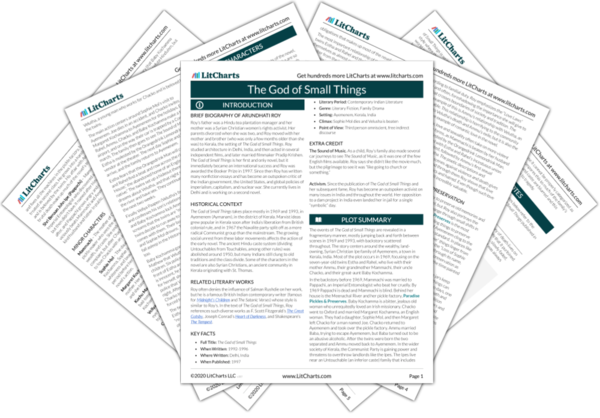Summary
Analysis
In 1969, while the “Welcome Home, Our Sophie Mol” cake is being served, Estha slips away and walks into Paradise Pickles to think. The factory is empty except for Ousa the “Bar Nowl.” Estha walks among shelves of preserved fruits and vegetables and he stirs a cauldron of banana jam, thinking about the Orangedrink Lemondrink Man and how he could show up at any minute.
The childlike part of the narrator’s voice not only spells things wrong but also emphasizes animal life, the small things that live alongside human dramas – like the bat at Sophie Mol’s funeral, Kochu Thomban the elephant, or Ousa the owl. Estha’s trauma has far-reaching effects.
Themes
As he stirs the jam Estha thinks “Two Thoughts” – “Anything can happen to anyone” and “It’s best to be prepared.” Then he starts wishing for a boat to row across the river, so that he could escape the Orangedrink Lemondrink Man if he came. Rahel enters the factory but Estha tries to ignore her. Finally he tells her his plan – he wants to go to the History House across the river.
These Two Thoughts are emphasized often as small things that lead to actions of great importance. Estha wants to make a hideout in case the Orangedrink Man shows up, and this leads to the History House becoming the scene of both love and violence.
Themes
The last person who claimed to have seen Kari Saipu’s house was Vellya Paapen, Velutha’s father. He said he saw Kari Saipu’s ghost while he was looking for a nutmeg tree, and he threw his sickle at the ghost and pinned it to a tree. Supposedly it remains there still, asking passersby for cigars.
This story adds an element of the fantastic to how the children see the world, and will later give them a way to supernaturally explain the tragic events of the History House.
Themes
Vellya Paapen does not know that Estha and Rahel think of Kari Saipu’s house as the “History House,” though, or that it is there that history will destroy his son and “capture the dreams” of the twins. Estha stirs the jam and he and Rahel come up with a plan to become Communists (so they don’t have to believe in ghosts) and then visit the History House while Ammu is napping.
Roy uses “history” in different ways, commenting on the English colonization of India as a “stealing and redreaming” of Indian dreams, and also focusing the history of caste divides and class struggles into a few poignant, dramatic moments.
Themes
Get the entire The God of Small Things LitChart as a printable PDF.

Rahel goes in for her “Gnap” and lies awake until Ammu falls asleep. She imagines Estha waiting for her by the river (holding the Marxist flag that Baby Kochamma was forced to wave) and then she somehow perceives that he is sitting on an old overturned boat. Rahel gets up and runs down to the river, and the children discover that it is indeed a boat, leaky and overgrown with plants. The twins think about their river (which is called the Meenachal) – the familiar part, then the “Really Deep,” and then the shallows where eels live.
The Marxist flag becomes another small thing that symbolizes a big thing – this kind of metaphor is called “metonymy.” The twins again share a mystical connection as Rahel discovers the boat that Estha is sitting on without actually seeing it. Rivers are often images of baptism or rebirth, and Estha does indeed long for the Meenachal to cleanse him after he is molested. The twins love the river, but they don’t understand its danger yet.
Themes
The twins put the boat in the water and it sinks, so they decide to clean it and carry it to Velutha. When they get to his hut Velutha and Vellya Paapen aren’t there, but Velutha’s paralyzed brother Kuttappen is. He stays in the corner all day and remains a “good, safe Paravan” who can’t read or write. The twins enter the hut and talk with Kuttappen about Sophie Mol and the boat. Kuttappen warns them about the river, as it can sometimes be a “wild thing.”
Vellya Paapen and Kuttappen both accept the shame and self-hatred that Untouchability is supposed to include. Velutha, on the other hand, has a secret anger in him against the unjust caste system. Kuttappen’s warning, combined with the earlier description of the Meenachal, is a foreshadowing of tragedy.
Themes
Estha and Rahel start singing an obscene song and Estha momentarily forgets the Orangedrink Lemondrink Man. Velutha returns and finds that he thinks of Ammu when he sees the twins now. He joins in their make-believe and then helps them fix the boat. Velutha takes a break and goes in to see Kuttappen, who asks him about the Communist march. Velutha knows he should be afraid that the Ipes saw him, and he tries to hate Ammu as “one of them,” but he can’t.
Velutha shows his kindness again by immediately helping the twins. Ammu and Velutha’s fate seems sealed by that one glance they shared, and they cannot escape the tragedy that awaits them. Velutha confirms that he was indeed in the march, showing that beyond his playful, kindly exterior he does have the sense of indignation toward the injustices of society that Ammu had hoped for.
Themes












